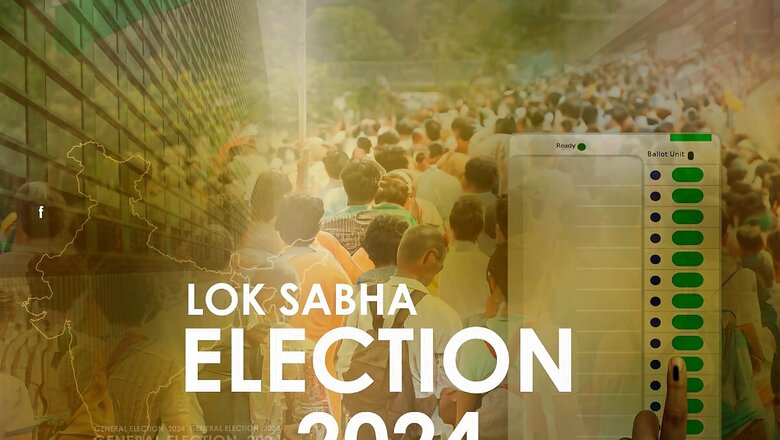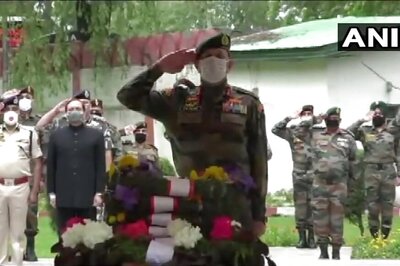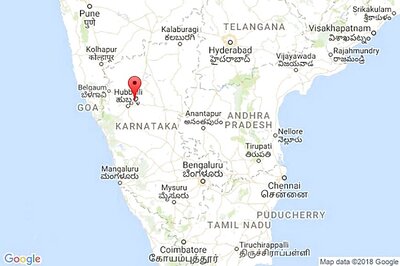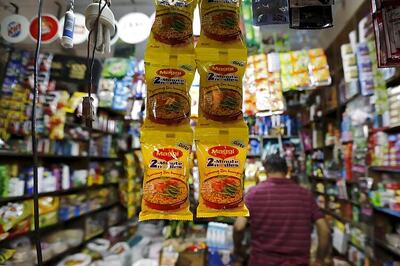
views
As the Indian summer intensifies, so does the fervour of its political climate. The curtain has risen on the 2024 general elections, presenting a tableau not just of competing political agendas, but of colliding worlds. While there’s a myriad of issues voters will benchmark the present dispensation against, including the much promulgated economic ambitions, and the larger-than-life ‘Modi Ki Guarantee’ to deliver the last mile, there’s something more nuanced and perhaps central to this particular voting exercise.
An alternative to the BJP is the INDIA coalition which is amidst a massive credibility crisis, exodus of party members, and perhaps a ditched campaign owing to no PM candidate to project against Modi. What do they have to offer? An alternative narrative which claims its basis in the secular character of the Constitution as a means to fight the alleged ‘saffronisation’ project by the so-called Hindutva faction.
Around 986 million people — the number is a composite of all faiths, genders, languages, age groups, affiliations, socio-economic categories, and political ideologies — are participating in this monumental electoral process. However, one question that every shade of voter is set to ponder upon, and that goes beyond mere policy discourse, is the dichotomy of identity. Will the soul of the nation align more with Bharat or with India? This identity conundrum is at the heart of the ongoing electoral contest, one that transcends the conventional Left-Right paradigm, delving into what it means to be ‘Indian’ in the 21st century.
The distinction between ‘Bharat’ and ‘India’ is not merely one of semantics; it is emblematic of a deeper, more visceral struggle for identity. While it’s a psephologist’s job to do political forecasting, for a social science enthusiast like myself, what’s interesting to see is the vehement binary of identities formed in the nation right now – Bharat and India. For starters, ‘Bharat’ represents a genuine pride in the rich tapestry of traditional ethos, ancient texts, timeless rituals, and the collective memory of a resilient civilisational state which resonates deeply across both rural and urban expanses of this piece of geography. ‘India’ arguably, on the other hand, has somehow become synonymous with the anglicised elite, who have severed their ties with their roots in an attempt to emulate the West.
It would be puerile to assume that the ‘India versus Bharat’ debate is strictly constrained to talk shops, prime-time debates, and self-anointed intellectual circles – it’s a debate that’s alive and kicking in every nook and corner of this nation, engaging both the young and the old across diverse social strata. There are over 1.85 crore first-time voters who are far better informed in a plethora of domains, absolutely comfortable in their skin, and vocal in their opinions. They have their priorities set — employment, poverty, inflation, corruption and population. However, in order to strive for these goals, what they are not ready to compromise is their identity. They refuse to be guilt-tripped and shamed for their choices, food, mannerisms, faith, attire, religious symbols, festivals, traditions, language, ideology, or even political leaning.
They hold the power to redefine and negotiate the terms of their identity—whether they want to be seen as inheritors of a rich civilisational legacy or as part of a borrowed identity, a cheap copy of ones who colonised them, marred by unwarranted elitism and entitlement. The mood of the nation is palpable and S Jaishankar’s words captured it rightly when he said, “We (Indians) are more Indian (now), more authentic (now).”
Call it what you will — a wave of decolonisation, Indic renaissance, reclamation of ‘Bharatiyata’, or reawakening of Bharat’s indigeneity — the fact of the matter is Indian society is at a crucial inflection point and reflecting seriously on how it aspires to be recognised moving forward, especially the younger demographics.
This discussion is particularly important when you look at the rapid transformation India has undergone over the last decade. Apart from hard data and tangible development of infrastructure, highways, number of unicorns, educational institutions, etc. what has also happened is a serious revisitation to the identity of this society. From its inception, the BJP has promised to revive the civilisational identity of India, precisely the Hindu identity, which they believed had been wronged and discriminated against owing to ‘politics of appeasement’ and perpetuation of neo-colonial project. This argument does have some merit to it.
For decades we had (even now) roads, towns, cities, and railway stations named after invaders and colonisers, almost eulogising them despite their barbaric acts. In pop culture too, this sentiment is precipitated with people questioning the mockery that is hurled against a particular ethnicity dubbing it as primitive, misogynistic, and regressive, often without any factual basis for it. This notion is finally being challenged. The nation has finally stood up and is asking some hard-hitting questions as to why only one faith is caricatured as superstitious or is used as a punching bag in standup comedy.
With the resurgence of Bharatiya ethos, the clan that represents ‘India’, a closed circle of illuminatis who have had a monopoly over this country’s discourse, is visibly perturbed. Interestingly, this is the same set of people who debunk the long-standing legacy of what ‘Bharat’ represents. Perhaps their idea of India starts from 1947. They’re leaving no stone unturned in creating a perception that Indian democracy is set to take its final breaths if Modi is re-elected. What is surprising is that this clan has the unflinching support of prominent North-Atlantic think tanks and Western media houses which constantly depict the current government in a negative light, often ignoring the nuanced realities of India’s internal dynamics, almost indicating that minorities in India are at the verge of denaturalisation. The portrayal by these entities tends to simplify complex issues into binary oppositions, favouring a narrative that aligns with their own geopolitical interests.
It is not for no reason that the notorious billionaires are committing to pumping in obscene amounts of money to stifle Indian democracy and the voice of the burgeoning nationalistic zeal. Consider the sterile democracy rankings, for instance, where India is deliberately ranked below Taliban-led Afghanistan in terms of academic freedom, or the Happiness Index where India ranks below Ukraine, Myanmar, and Palestine. This defies commonsensical logic!
Unfortunately, one cannot simply brush these aside as mere opinions because they have tangible impacts on India’s sovereignty ratings and credit scores, and affect investor morale to engage with a democracy like India. What is this, if not the weaponisation of academia, or, I dare say, a perpetuation of neo-colonialism? These incidents, often strategically utilised by the so-called ‘intellectual class’ in our country, counterproductively serve to further fuel the grievances of the ‘Bharatiya’ faction reinforcing the popular belief that anti-India forces are working to derail India’s unprecedented rise.
The intellectual class backing the INDIA coalition has itself to blame for creating this perception. If I were to pinpoint one of the biggest flaws with the Opposition’s campaign, it is their frenzy obsession with negative messaging and fear-mongering. Their messaging is a litany list of negative campaigning – a despondent tone often undermining India’s feats be it on the economic front, scientific developments, military might, foreign policy, and so on and so forth. What they overlook is often their claims are not backed by the facts. At the grassroots level, such messaging gives an impression that the INDIA bloc is hesitating from taking genuine pride in what Indians achieve collectively, of which, no political party is a custodian.
Why would a voter want to vouch for a cabal which is dissolved in dejection, refraining from explicitly standing with the ‘Bharatiya’ ethos which is synonymous with Hindu ethos or celebrating religious symbols of the majority community? They come across as ostentatious, condescending, a little too rich, and a little too paternalistic when they shame the voter for exercising their democratic right.
On the contrary, the very lexicon of the BJP woos the voter, one popular example being Modi calling himself ‘pradhan sevak’. They have managed to tap into the aspirations of the voters, especially with the younger population, promising to open some sort of a Pandora’s box of opportunities for them. What’s interesting is how the BJP has managed to craftily balance the development issue and the identity issue all this while, dismantling the perception that culture and development can’t go hand in hand. The BJP, under Modi’s leadership, has championed a vision that seeks to revive and celebrate the historical and cultural heritage of Bharat. This vision is articulated as an attempt to reclaim a sense of pride in India’s indigenous traditions and values, which they argue have been overshadowed by years of foreign influence and internal divisiveness.
The Modi government is often alleged for a weaponising history, flexing the so-called Hindutva muscle, and engaging in sectarianism. Well as far as the facts are considered, these allegations don’t hold water. The same clan when asked to produce facts to substantiate their viewpoint fails to name a single state policy which is exclusivist. So far, not a word has been changed in the History textbooks.
On the contrary, the current government often comes under flak from the Right wing for enduring certain provisions they call ‘draconian’ including but not limited to the state control exclusively over Hindu temples, delaying the Uniform Civil Code (UCC), not scraping the notorious Waqf Act 1995 or the Places of Worship Act 1991, no attempt to relocate Kashmiri Pandits in the valley, and we still have a town called Bakhtiyarpur, named after a medieval invader who is blamed for significant cultural and historical destruction in the region. This array of issues underscores the complex and often contentious nature of identity politics in India. It’s peculiarly funny that the ruling party is slammed by both sides of the political spectrum.
It would be safe to conclude that this debate is rooted in identity rather than conflicting ideologies per se. This critical juncture in Indian politics is not just a battle over policies or governance models, but a deeper contest over the narrative and identity of the nation itself. The discourse around ‘Bharat’ versus ‘India’ thus becomes a focal point in this election. The ongoing general elections of 2024 serve as a pivotal moment where nearly a billion voters have the opportunity to decide the direction in which they want their country to proceed. These voters, a diverse mosaic of religions, languages, and cultural backgrounds, are united by the shared task of shaping the future of their nation.
Some scholars claim that India is undergoing a serious identity crisis. Well, I beg to differ. I think the theoretical debate that Indians are in some identity crisis is facile and divorced from ground reality. When you travel across this country, you know that Indians have already realised their identity i.e., their Bharatiyata. The outcome of the general elections will put an official stamp on this assertion. It’s worth pondering however, will the outcome reinforce the traditionalist and revivalist narrative of Bharat, or will it favour a more Left-leaning vision of India? The answer will shape India’s path forward, influencing not only its domestic policies but also its position and identity on the world stage.
This is a transformative period in Indian history, and every vote is a testament to the ongoing dialogue about the nation’s past, present, and future.
The author is a research assistant at the Department of Public and International Affairs in City University of Hong Kong (CityU). Views expressed in the above piece are personal and solely that of the author. They do not necessarily reflect News18’s views.



















Comments
0 comment